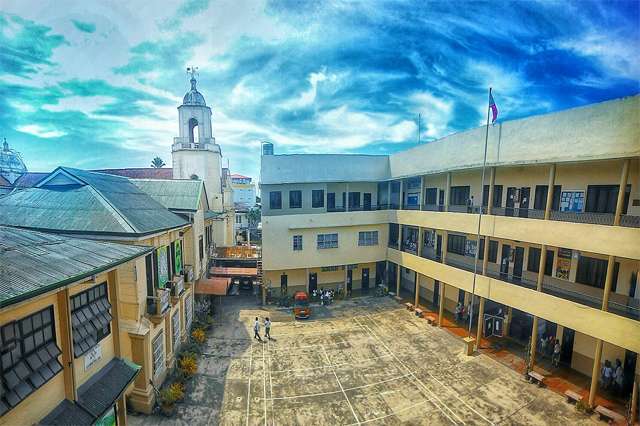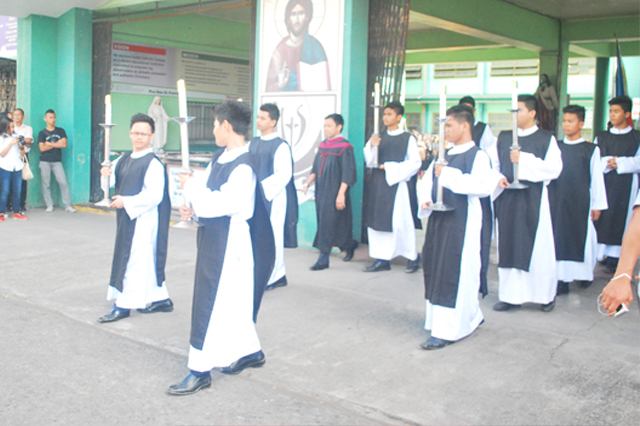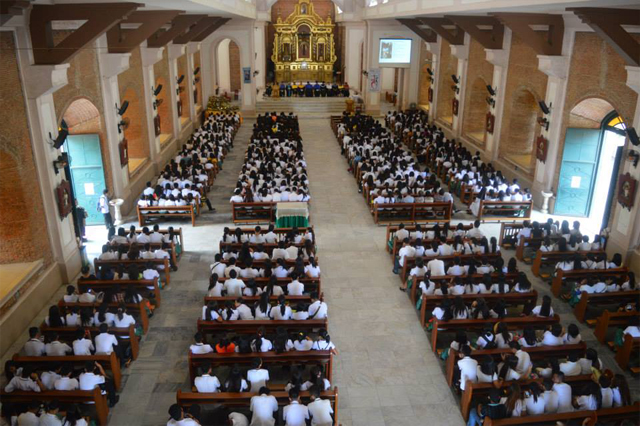Welcome to Aklan Catholic College (original) (raw)
aboutus

Our History
The noble idea of establishing an educational institution in the college level in Aklan offering academic courses had its inception before the last war. The inclusive months of August? October, 1941 were devoted to its organization. The outbreak of the War stalled its foundation. After the liberation, prominent men and educators in Aklan adhered and joined efforts to organize. A committee composed of seven members was constituted. The committee elected Mr. Digno Alba as Chairman. A finance committee headed by Mr. Vicente M. Salido and a committee on style to draft the Articles of Incorporation and By-laws headed by Atty. Ludovico O. Peralta were also formed. A group took charge of conducting a campaign for stockholders and students throughout Aklan. Among others, this group was composed of Mr. Digno Alba, Mr. Filemon F. Guerra, Mr. Emeterio L. Prado, Mr. Luis Enriquez, Atty. Ludovico O. Peralta, Mr. Vicente M. Salido, Dr. Rafael S. Tumbokon, Mr. Manuel O. Peralta, Mr. Teodoro P. Icamina and Mr. Juan Tolentino. On August 18, 1945, in a meeting of stockholders, the Articles of Incorporation and By-Laws drafted by the Peralta Committee were approved and submitted to the Securities and Exchange Commission. Moreover, the fifteen incorporators and the members of the Board of Trustees were elected. The fifteen incorporators elected according to the number of votes cast were: Dean Filemon G. Guerra, Atty. Manuel Laserna, Atty. Raz Me?ez, Atty. Ludovico O. Peralta, Dr. Federico R. Me?ez, Mr. Digno Alba, Prof. Vicente M. Salido, Prof. Emeterio L. Prado, Atty. Jose A. Urquiola, Prof. Jose M. Reyes, Dr. Querubin Fulgencio, Mr. Jesus Aranas, Dr. Salvador R. Acevedo, Dr. Rafael S. Tumbokon and Dr. Conrado F. Quimpo. The first Board of Trustees was presided by Atty. Jose Q. Peralta. Other members of the first Board of Trustees elected were Dean Filemon F. Guerra, Atty. Manuel Laserna, Dr. Federico R. Me?ez, Atty. Ludovico O. Peralta, Mr. Digno Alba, Prof. Vicente Salido, Prof. Emeterio L. Prado, Atty. Jose A. Urquiola, Prof. Jose M. Reyes, Dr. Querubin Fulgencio, Mr. Jesus Aranas, Dr. Salvador R. Acevedo, Dr. Rafael S. Tumbokon and Dr. Conrado F. Quimpo. Dr. Federico R. Me?ez was elected by the stock subscribers as the first treasurer of the corporation.
There were 73 original stockholders of the Aklan College, Inc., to wit; Digno Alba, George Alba, Ricardo Alba, Edita Albar, Joaquin Acevedo, Salvador Acevedo, Jesus Aranas, Manuel Andrade, Lucila Advincula, Adorico Bantigue, Benjamin Barrios, Maria Barrios, Josedicio Bautista, Miguel Calizo, Crispulo Cruz, Eulogio Cleope, Leopoldo dela Cruz, Luis Enriquez, Pamposa U. Sitioko, Salvador Esmero, Querubin Fulgencio, Eduardo Fuerte, Carolina Francisco, Filemeon F. Guerra, Juanito Garcia, Patria Gonzales, Nicanor Gonzales, Florencio Garcia, Teodoro Icamina, Florentina Icamina, Ester Jurilla, Albina Losada, Pacita Lamuntao, Federico Luces, Manuel Laserna, Jose Mabasa, Salvador Mabasa, Federico Me?ez, Jose R. Me?ez, Nicena T. Morales, Iluminado Motus, Pedro Oquendo, Ludovico Peralta, Manuel Peralta, Jose Peralta, Emeterio L. Prado, Conrado Quimpo, Fidel Quimpo, Jose Quimpo, Vicente Quimpo, Rustico Quimpo, Castor Reyes, Emeterio Roldan, Vicente Romaquin, Loreto del Rosario, Jose M. Reyes, Salvador Reyes, Jose Salazar, Vicente M. Salido, Bienvenido Songco, Soledad Suarez, Rafael Tumbokon, Crisanta Ureta, Jose Urquiola, Edicio Venturanza, Sergio Vizcarra, Simplicia Vega, Adriano Seraspi, Juan Tolentino Jr. and Avelino Torre.
COLLEGE OPENING
Mr. Filemon F. Guerra was the first Dean at the opening of Aklan College. He organized a strong faculty of mostly M.A. degree holders. On July 9, 1945, classes in the Aklan College formally opened with 180 students? 90 in the collegiate department and 90 pupils in the elementary grades.
The Aklan College occupied the concrete building owned by Mr. Vicente Salas Reyes located at the corner of Plaridel (now Pastrana) and 19 Martyrs Streets. In June 1948, the college moved to its present site, also called Main Campus.
Courses offered in the collegiate department ranged from the Two-Year Normal, leading to Elementary Teachers Certificate (E.T.C.), Two-General Preparatory, leading to the degree of Associate in Arts (A.A) to the complete courses in Education and Liberal Arts, leading to the degree of Bachelor of Science in Education (B.S.E.), Bachelor of Science in Home Economics (B.S.H.E), Bachelor of Arts (A.B.), Bachelor of Science (B.S.) and Bachelor of Philosophy (Ph.B.), respectively.
GOVERNMENT RECOGNITION
The first certificate of recognition was granted to the College on July 1, 1947, and personally brought by Bishop Jose Ma. Cuenco to Kalibo on October 2, 1947. The date was an occasion of rejoicing in the college.
FIRST GRADUATE
Of the 90 students who enrolled in the collegiate department in the first year of Aklan College, 35 students graduated in the year 1947 from the Normal Department and from the Liberal Arts Department with the title of E.T.C. and A.A., respectively.
BISHOP CUENCO AND CARDINAL SIN: PATRON AND BENEFACTOR
Like many other organizations, the College was never an exemption to financial trials. It was in the second year of its existence that the College suffered financial difficulties for its expansion so that it had to seek the aid of the Catholic Church through the Bishop of Jaro, His Excellency, Most Rev. Jose Ma. Cuenco. Upon invitation of Mr. Digno Alba and Rt. Rev. Msgr. Jose Ituralde, the bishop as representative of the Church, joined the College with no less than P85,000 investment to acquire books, equipment and apparatus, to reconstruct the college building, to construct ROTC Armory and Home Economics Building, and to pay the salaries of the faculty. It was with the joining of the bishop and some of the clergy as members of administration and faculty that Aklan College was converted to becoming a Catholic institution where religious instruction had been integrated in the curricula. Thus, Aklan College begot the dangling phrase in its name?a Catholic institution?. With his deep interest to the advocacy of Catholic education in his diocese, His Excellency, Most Rev. Jose Ma. Cuenco was regarded as the Patron of Aklan College as a Catholic institution. Moreover, the father of the good bishop was also an Aklanon.
Another part of the beautiful historical vignette of the College unknown to many alumni, students, teachers and even stockholders was His Eminence Jaime Cardinal Sin?s crucial role in the transfer of governance of then Aklan College and now Aklan Catholic College from the Diocese of Jaro to the Diocese of Capiz and eventually to Kalibo. Little was it known that the Diocese of Jaro owned majority stocks of the corporation. In his enabling persuasion, Cardinal Sin captured the gracious will of Bishop Cuenco to donate all shares and holdings with the College under the proviso that if Aklan become a diocese, the same should be given to it. The cardinal then was named the eminent benefactor of the College.
COLLEGE OF LAW AND ENGINEERING AND THE GRADUATE SCHOOL
Aklan College is the first higher education institution in Aklan to offer law and graduate school courses. Anticipating the need for a college of law in the province, Aklan College offered a Bachelor of Law course in 1958 but it was closed in 1972. Early in 1992, the College of Law was revived.
In 1969, Aklan College offered engineering programs as the answer to the demand of the people of Aklan. The College administration set up a separate engineering building situated at Andagao, Kalibo. In 2004, the department and programs were closed to cater to the timely demands on relevant programs for the new breed.
Back in 1964, the graduate school was established. Since then, the graduate school has been providing teachers of both public and private institutions the needed graduate education or Master?s degree.
During the administration of Msgr. Adolfo P. Depra, the Graduate Education Programs were also expanded by having consortium with the University of San Agustin for the Masters in Business Administration (MBA) and Master of Arts in Education (M.A.Ed.), major in English. The Central Philippine University (CPU) has also tied up with the College to offer M.A.Ed. in Mathematics and the Doctor of Education (Ed.D.) as extension programs with the College. These consortia have been the first of its kind in the province of Aklan.
STUDENT ORGANIZATIONS, PUBLICATIONS, AND EXTRA-CURRICULAR ACTIVITIES DURING THE FORMATIVE YEARS
Most of the organizations of students today found their beginnings during the formative years of the College. Among the early activities were the annual oratorical contests, dramatic presentations and dance extravaganza, the Student Council, the Debating Club, the annual college popularity contest and the magnificent coronation ceremonies which follow election, the folk dance demonstration, convocations, the Junior reception, the publication of an annual called the Acorn (now Acian) and subsequently named The Aklan Collegian (now the official publication of the college department). Eventually, institutionalizing co-academic organizations in English, Mathematics, Sciences, Social Sciences, and other departmental entities were encouraged to foster students? Participation in curriculum designs and programs.
ADMINISTRATION
The administration and management of the college is vested on the Board of Directors composed originally of fifteen and later reduced to ten for a term of one year. The following served as the Presidents of the Board of Trustees: From August 1945 to December 1948 ? Judge Jose O. Peralta, from December 1948 to January 1953, Arch. Jose Ma. Cuenco who was succeeded by Arch. Antonio Frondosa, then Bishop of Capiz, followed by Bishop Juan Nilmar. Bishop Gabriel V. Reyes followed in succession. When Bishop Reyes was transferred to Antipolo in January 2003, His Most Rev. Jose Romeo O. Lazo, D.D., as the new Bishop of Kalibo, became the new Chairman of the Board.
THE FATHER RECTORS
S.V.D. Father Eugene Stoll and Luis Creder were the two foreign Rectors of Aklan College. On April 12, 1954 and at a time of economic difficulties and financial hardships of the Filipino people, Rt. Msgr. Salvador M. Mabasa assumed the rectorship. Notwithstanding, the economic climate then prevailing, Aklan College during the first year of the Mabasa rectorship registered the biggest enrolment in all departments. Budget wise and administration oriented, he time-tabled a development plan for the expansion of Aklan College, Msgr. Mabasa began the phase-by-phase development of the college with the help of the student organizations, alumni, and faculty in 1954. On April 3, 1956, a new high school building was constructed under the Mabasa administration; a prominent three-storey building facing the Kalibo Municipal Park was constructed. Along with that was the construction of the ACC Gym-auditorium, purchase of laboratory apparatus and cementing of the quadrangle and ground. Eventually, a lot was acquired in Andagao where an engineering building was erected. In his lifetime, Msgr. Mabasa never tired himself of analyzing and synthesizing the problems of the college vis-?-vis economic conditions. Well-meaning persons, alumni and former faculty members refered to him fondly as the rector-architect of Aklan College development.
When Msgr. Mabasa died, he was succeeded by Msgr. Jose S. Salido. Msgr. Salido?s stint as a rector was short-lived, since he died a year after his assumption to rectorship. Yet, he played a major role in shaping the development of Aklan College as Treasurer for twenty years.
Rt. Rev. Msgr. Conrado Mesina succeeded Msgr. Salido. Management conscious Rector with a penchant for careful planning, Msgr. Mesina assiduously studied education trends.
Rt. Rev. Msgr. Adolpo P. Depra succeeded the Rectorship after Msgr Mesina. He assumed rectorship on July 19, 1988. Right after his investiture, he saw fit the first grand alumni reunion in February 1989. The reunion of the college?s alumni was an occasion for Msgr. Depra to emphasize Aklan College vision of acquiring a university status by opening relevant programs and consortia with universities in Iloilo.
THE PAST DEANS
Teacher Education and Liberal Arts Department recounts the services of the the following who served successively as Deans: Mr. Filemon F. Guerra, Mr. Emeterio L. Prado, Dr. Miguel Yap, Mr. Protasio Magdael, Atty. Josue F. Gomez, Dr. Constancio I. Constantino, Prof. Donoso B. Mabasa, and Ms. Agnes Calizo, Assistant Dean.
Engineering Department had the following deans until its closure in 2004 namely: Antonio M. Mabasa, Mansueto C. Palmani, Eugenio L. Mirto, Oscar Barrios, Rimalubo S. Panaligan, Jafet Asis, Engr. Raymond Gonzales III, Engr. Ronald S. Saldivia, and Engr. Alice M. Coching.
Graduate School lists the following: Dr. Ernesto dela Cruz was the first Dean, followed by Dr. Miguel U. Yap, Dr. Constancio I. Constantino, and Rt. Rev. Msgr. Adolfo P. Depra with Ms. Evelina G. Gayo as the Assistant Dean.
Judge Ludovico O. Peralta was the first dean followed by his brother Judge Jose O. Peralta at the closure of the program. Upon its reopening1992, Atty. Victorio R. Mabasa took the Deanship. Judge Pedro M. Icamina, Atty. Alonzo R. Tinagan and Atty. Edgar Peralta followed in succession.
ELEMENTARY HIGH SCHOOL PAST PRINCIPALS
Since the College opened elementary education, it had the following principals: Dolores T. Advincula, Clavelina O. Zomil, Esperanza Amparo-Tapales, Jose I. Ricafuente, Victoria U. Acevedo, Leodegario M. Advincula, S. Arlene Regalado, Noeme L. Ricafuente, Cecilia S. Calizo, and Ms. Rita Hilda T. Feliciano.
Ms. Isidra Laserna-Mirto was the first principal of the high school department followed by Atty. Josue M. Gomez, Ms. Soledad M. Laserna, Prof. Donosa B. Mabasa, Ms. Froilana T. Malilay, Mrs. Elfa T. de Blas acted as OIC principal.
THE ALUMNI
Aklan College alumni are everywhere in government and non-government services, in the military, in medicine, in law, in the teaching profession, in priesthood, business, politics, education and other fields of human endeavor.
In addition to the existing alumni association, a group of enthusiastic alumni took the initiative to organize an AC Alumni Foundation with the aim to provide strong support to the alumni activities of Aklan College. Alumni in the high school and collegiate departments are helping to translate the aspirations and directions of Aklan College into reality.

ACC Vision
We envision Aklan Catholic College as a vibrant educational institution committed to empowering stakeholders as globally competent and authentic Christians.

ACC Mission
Continuously evaluate the relevance of programs and services and the functionality of structures, processes and leadership styles.
Relentlessly expedite leadership and professional development through continuing education.
Steadfastly inculcate Gospel values for the integral development of the stakeholders.
Amply produce excellent graduates through current researches, relevant curricular offerings and responsive community extension services.
Purposively channel resources towards the sustainability of the institution through value innovative programs.

ACC CORE Values
Aklan Catholic College commits to the value of:
- FAITH: We cultivate a way of life that is wholly dependent on God and expresses itself in generous loving service for God and country.
- ACCOUNTABILITY:We are accountable to God, to our country and to our community. We demonstrate accountability through our skills, behavior, attitude and performance.
- CHARACTER and COMPETENCE:We are passionate and intensely focus in serving our stakeholders and helping them achieve their goals.
- EXCELLENCE:We strive for excellence that glorifies God in all areas of life.
- SERVICE:We put all stakeholders at the top of our minds, giving them the best service, satisfying their requirement and valued them for life.
